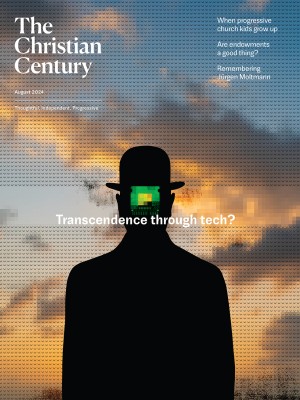August 18, Ordinary 20B (John 6:51–58)
The Greek word sarx could well be translated as “hamburger” rather than “flesh.”
When I teach children about the sacrament of communion, one of my favorite parts is making the “our daily bread” collage. I didn’t come up with this activity; I adapted it from the Augsburg Fortress curriculum Fed and Forgiven, the fourth- through sixth-grade edition. Though it was published long enough ago to come with a CD-ROM, it still works. It’s been interesting to watch ten-year-olds’ responses evolve over my 20-year career.
The activity begins by reading the “Give us this day our daily bread” portion of Martin Luther’s commentary on the Lord’s Prayer from his Small Catechism. I always point out that Luther interprets “daily bread” in a maximalist way. He does not think human beings should be content with just the bare essentials of existence—a cardboard box for shelter, a crust of bread for food. He writes that we should pray for God to provide such necessities as good government, good weather, health, and even “upright children,” which always gets a chuckle. I ask the kids to write “Our Daily Bread” across a piece of construction paper and then, using a pile of well-thumbed magazines, pick out images that fit their definition. What might we add to Luther’s list in the 21st century?
Read our latest issue or browse back issues.
While the occasional video game console or pair of designer leggings does come up, overall I am always impressed by how seriously the kids take the exercise. Pets and cell phones always appear, but so do vegetables, bicycles, books, and even siblings. Good jobs were added after the Great Recession, Wi-Fi during the COVID epidemic, first responders during the wildfires of last summer.
Almost every year a kid cuts out a picture of a toilet. Luther may not have had one, but the kids know that modern societies can’t do without. A parent usually objects. A toilet is too naked, too visceral, for the lofty topic of communion.
Jesus’ audience in John 6 might concur.
This week’s passage is the most visceral of the bread of life series. Any spiritual gloss is set aside. Jesus is talking about the very human activity of eating and drinking. The elements themselves are described crudely. In nine verses Jesus uses the word flesh seven times, blood four times. It’s exactly as bad as it sounds. The Jewish Annotated New Testament notes that “the literal meaning is not only repellent but offensive.” The Greek word sarx could well be translated as “hamburger.” To think of communion like this is challenging. More than one pastor has a story of a child really hearing the words of institution and responding with, “Eww, gross.”
The Jews of John’s Gospel aren’t the only ones who dispute this text among themselves. Luther didn’t like it either, at least not in his sermons on John 6. “This cannot be applied to the sacrament,” he writes. This is not “the sort of flesh from which red sausages are made.” Luther admits that he is directing his sermon “against the Arians, the Sacramentarians, and other schismatic spirits and fanatics,” so perhaps we can forgive a reading so contrary to the plain meaning of the text.
Perhaps, removed from the transubstantiation debate, Luther might begrudgingly admit that the same God who he says in his Small Catechism provides us with “everything included in the necessities and nourishment for our bodies” would not eschew our baser needs. The logical conclusion of the incarnation—the Word that becomes flesh in John 1:14—is a Word that understands the need for red sausages and the like and provides them.
As the children present their collages, I affirm their choices and point out an important detail. In the Lord’s Prayer Jesus directs his followers to pray not for my daily bread but for ours. The collective call is a reminder: Christians are embedded in community; our neighbors’ needs are our own.
Jesus says that eating his body and drinking his blood allows his followers to abide in him and he in them. Praying the Lord’s Prayer, partaking in communion, being Christian people—this is a group project. The living bread of heaven came down from heaven into the realities of human life. Christ followers too must be willing to come down from their lofty ideals and enter the messiness, the offensiveness, of human need.
In the journey toward eternal life, the temporal cannot be swept aside. Maslow’s Hierarchy of Needs reminds us that it is only when our baser requirements are supplied that we can realize greater goals. We are not satisfied with the bread our ancestors ate but long for something more. Good jobs, Wi-Fi, first responders, and a world where, in Luther’s words, “good government, good weather, peace, health, decency, honor, good friends, and faithful neighbors” are the common good of all. Toilets and upright children are for everyone.
Eating the living bread of heaven, Jesus’ own flesh and blood, is only offensive in isolation. His vision of abiding together changes everything. Our daily bread, given by God, shared in community, is paradise, its collage a vision of hope.






